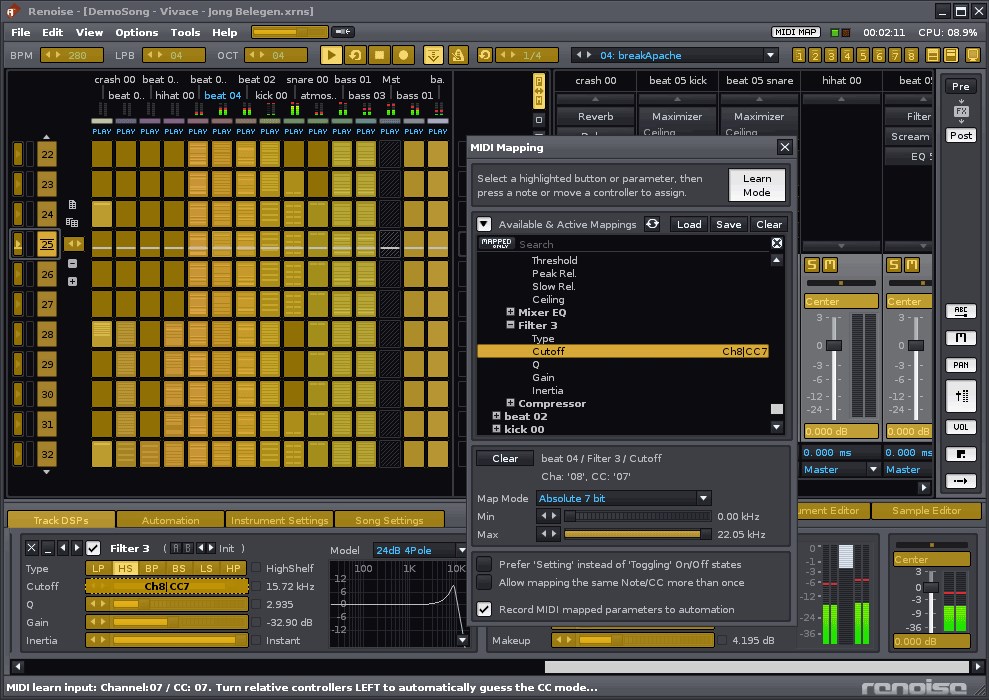
You are an educational or non-profit organization. You are an individual or business using REAPER commercially, and yearly gross revenue does not exceed USD $20,000, or You are an individual, and REAPER is only for your personal use, or The site says this about the discount (which in my experience goes by the honor system): You can give it whirl to see how well it works.
#Live audio in renoise free#
The free version is time-limited but fully functional. I do whatever number of takes, do some comping, and export what I like to wav. I export the song to wav, and import it into Reaper, and use Reaper to record live audio.

I record guitar and bass and vox all the time for my Renoise tracks. Look into Reaper, which is probably one of the cheapest DAW’s out there. Or maybe use some ReWire thing and sync up Renoise with another DAW. You could experiment with running Redux as a VST in another DAW that is more suited for multitrack recording, I havent tried but think you should be able to load up your Renoise project in Redux. My prefered way though is using a DAW like cubase/studio one, with a more traditionel sequenzer layout, especially oriented on recording and with a bunch of standard shortcut keys that handles rec start/stop/retake whatever. In theory you could set your pattern length to 512, 1024 or whatever your max is, to give you a couple of minutes to have the guitar track running, but it will make your project a living nightmare to organize. I chop it up to avoid having extremely long patterns. After this I chop it up and just trigger the chords and riffs with my keyboard. After this I go to the sample editor and it is easy to visually see when I have played and when I muted. If I screw up, I mute the strings and wait for the next beat and try again, but I kinda just let the recording roll ending up in one long recording. If I record in Renoise, which I sometimes do, I loop the specific pattern, start it a couple of beats before the end to get a kind of “pre-count metronome” feel of the tempo and then just make one long recording. Tracker users don't know what they're missing, overwhelmingly because they can't read or write music, have little understanding of musical theory and no experience of playing in ensemble with trained musicians.Renoise isn’t really the best program for live instrument multitrack recording, and it has never been the idea of the program.īut yes you can do it… Hit Shift+Alt+R, look at the level, click speaker icon for monitoring your sound.
#Live audio in renoise professional#
They're intolerably crude if you're a professional user who has deadlines to meet, but also intolerably crude if you're merely an amateur with musical training. Not an issue if you make primitive electronic music, a cataclysmic failure if you deal with big, complicated arrangements. That's simply not possible with a tracker, either using numerical or piano roll display. Someone with a modicum of training can follow an orchestral score with dozens of parts, scanning the score in real time and picking out the harmonic progression and main melodic theme.

Trackers represent music in a way that is alien to people who can read classical notation and who have studied composition. If that sounds like an exotic requirement, try arranging a piece in a tracker based around drums recorded without a click, or using a tracker to arrange a version of, say, "Anyone Who Had A Heart" by Burt Bacharach.
#Live audio in renoise series#
I can draw in a series of gradual tempo changes to an automation channel, or extract tempo and groove from an audio or MIDI track to use as a tempo map. The grid in my piano roll display will conform to my chosen timing, as will the output of my score editor. Septuplets in 9/8 are no more difficult than straight eights in 4/4. In a proper sequencer, I can play in a phrase, then instantly quantise it to any time signature and any tuplet I want. I need things like timecode support, which is a weird niche thing, but also things like tempo and time signature maps, which aren't. Not genre-based electronic music, but music in it's broadest sense - from bebop to Bulgarian folk music, from Stravinsky to Stockhausen, from Abba to Zappa.


 0 kommentar(er)
0 kommentar(er)
